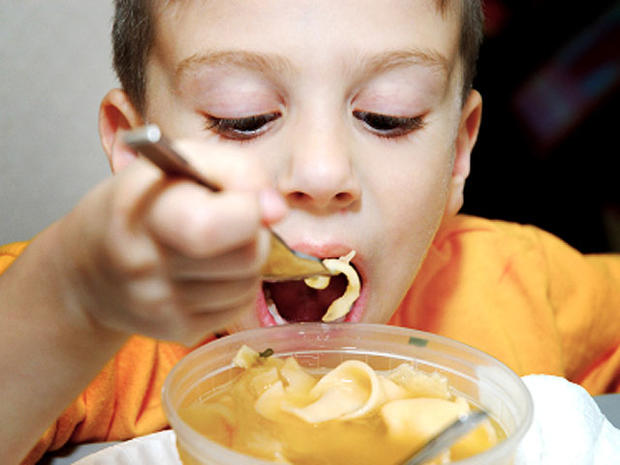Pre-packaged foods for toddlers too high in sodium, says study
Limiting salt intake is an oft-repeated piece of health advice for adults, because too much sodium over time may increase risk for heart attack and strokes.
U.S. dietary guidelines suggest people should take in no more than 2,300 milligrams of sodium each day, while the American Heart Association recommends an even lower amount of 1,500 milligrams. Surveys, however, show most Americans are averaging 3,400 milligrams each day.
Now, a new study suggests toddlers also may be getting far too much salt if they're eating pre-packaged foods. Researchers tested random products and found 75 percent of pre-packaged meals and savory snacks for toddlers were high in sodium. The authors fear taking in too much salt at such an early age can lead to unhealthy habits that last a lifetime.
"Our concern is the possible long-term health risks of introducing high levels of sodium in a child's diet, because high blood pressure, as well as a preference for salty foods may develop early in life," lead researcher Joyce Maalouf, a fellow at the National Center for Chronic Disease Prevention and Health Promotion at the Centers for Disease Control and Prevention (CDC), said in a statement. "The less sodium in an infant's or toddler's diet, the less he or she may want it when older."
For the study, which is considered preliminary since it was presented at a medical conference and is not yet published in a peer-reviewed journal, Maalouf and her team looked at 1,115 food products for babies and toddlers, which included pre-packaged meals and snacks. A product was considered high in sodium by researchers if it contained more than 210 milligrams per serving.
They found toddler meals on average had significantly more sodium than baby meals, with some as high as 630 milligrams per serving. That means one toddler meal contains 40 percent of the AHA's daily recommended allotment of sodium, according to the AHA.
The study echoes previous research that pre-packaged foods are major culprits for dietary sodium. It was presented March 21 at the American Heart Association's annual meeting in New Orleans.
"I'm not too surprised," Andrea Rumschlag, a pediatric dietician at the Cleveland Clinic told CBSNews.com of the study's findings. She was not involved in the research.
"It's good information for parents to see that packaged food in any way, shape or form is always going to be high in sodium."
Rumschlag equates some of these pre-packaged toddler meals to frozen TV dinners for adults, which can be high in salt. While the AHA recommends a daily limit of 1,500 milligrams of sodium, she said that toddlers ages 1 to 3 should have even less -- no more than 1,000 milligrams per day. Toddlers have more sensitive taste buds, she added, so if they're used to salty foods from the get go, they're more likely to reach for a salt shaker as they get older to compensate. That could contribute to their risk of high blood pressure and cardiac problems later in life.
"You're setting them up to have that salty taste," she said.
- Cutting salt to recommended levels could prevent hundreds of thousands deaths
- "Salty six" foods a major source of sodium, says American Heart Association
- Salty diet may increase risk for autoimmune diseases
Rumschlag recommends that if parents are going to buy pre-packaged foods, check the label and skip items that contain more than 100 milligrams of sodium. Fresh, canned or frozen fruits are a better snack option than a child-sized pack of crackers, she said.
"They can still be nutritious, still be quick, but won't have as many of these additives," she said.
